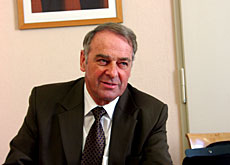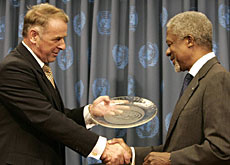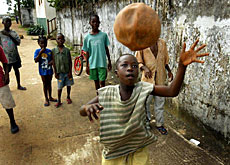Ogi bets on power of sport to change lives

Former Swiss President Adolf Ogi believes the 2005 United Nations Year of Sport can help improve the lives of millions of people in the developing world.
In an interview with swissinfo, the special adviser to UN Secretary-General Kofi Annan explains how sport and physical education can combat global poverty.
Ogi was appointed head of the UN’s Sport for Development and Peace Office in the Swiss city of Geneva in 2001.
He was a minister in the Swiss cabinet for 12 years from 1988 and twice served in the largely ceremonial post of Swiss president.
Last December Ogi officially launched the UN International Year of Sport and Physical Education at a ceremony in New York attended by Annan and Swiss tennis star Roger Federer.
swissinfo: What do you hope can be achieved during the 2005 UN Year of Sport?
A.O.: My aim – and you might say I’m being a bit naive here – is to show that sport can help a new generation of young people who in 20 to 30 years will be ready to take up public office and build a better world. And I’m talking here about changing things at a political, economic, scientific and religious level.
swissinfo: How did you manage to persuade Kofi Annan and the UN member states that they should support the idea of a Year of Sport?
A.O.: It wasn’t hard to convince Kofi Annan, because he has always encouraged me to pursue [the idea]. It was a bit more difficult at the UN itself, because I am not in a position where I can directly put forward proposals to member states.
I first mooted the idea in January 2003 at a conference of sports ministers in Paris. With the help of Tunisia, which has good contacts around the world, we were able to come up with a resolution [to be tabled at the UN General Assembly]. I managed to persuade the president of the General Assembly to put the topic on the list of subjects to be voted on.
I had expected that we wouldn’t get on the list before 2008 and that it would be 2012 before anything concrete would happen. But last November, less than 12 months after the idea was proposed, the 191 UN member states voted in favour of the resolution – a very pleasing result.
swissinfo: How can sport be used to help promote peace in the world?
A.O.: In the developing world you simply cannot inspire or excite young people with the type of UN programmes which exist today. If you really want to engage with the youth of today you need to offer them sports activities. In many countries, sport is the only hope people have.
Simply put, if you give a group of young people a ball they will quickly form a team to play football, volleyball or handball. They will play together, learn to integrate and temporarily forget the stress of their daily lives. They will also learn to respect their opponents, as well as the rules of the game and the referee’s decision.
swissinfo: But does fair play in sport really lead to a heightened sense of fair play in politics or society in general?
A.O.: Well, fair play in sport could set an example for other walks of life. Unfortunately, this notion of fair play is sometimes destroyed – particularly in the West – by the hooligan contingent.
But if you look at sport as a whole, you could say that it is similar to an iceberg. We generally only see the tip [sport at a professional level], but what is going on underneath this, the way physical education is having a positive impact on all walks of life, more often than not goes unnoticed.
swissinfo: But isn’t sport really what you might call a luxury? Don’t developing countries need hospitals and schools more than footballs and cricket bats?
A.O.: Of course they need these things as well, and the UN also runs programmes in areas [such as health and education]. But sport is not a question of money or luxury.
Some time ago I visited the Palestinian territories and saw for myself what impact sport can have on the lives of individuals. Physical activity is for the children there the only chance they have of getting away from the traumatic time they are living in, even if this is only for a few minutes each day.
swissinfo: One of the aims next year is to show that sport is not just a game, but can help with economic, social and humanitarian development. Is this anything more than just good intention?
A.O.: The best way of answering this is to give you an example. In conjunction with the International Labour Organization, we have helped to set up small- and medium-sized companies in Mozambique which are making money by producing and selling items such as footballs and sportswear.
So you see that sport is not just sport for its own sake: it also offers employment, business opportunities and money – in short, sport can be everything and anything.
swissinfo-interview
Highlights of the UN Year of Sport include a series of global conferences on the links between sport and health, education, peace and the environment.
Key events are due to take place in Tunis, Bangkok and Moscow.
The biggest political event is set to be a Swiss-hosted international conference on sport and development in December.

In compliance with the JTI standards
More: SWI swissinfo.ch certified by the Journalism Trust Initiative


You can find an overview of ongoing debates with our journalists here . Please join us!
If you want to start a conversation about a topic raised in this article or want to report factual errors, email us at english@swissinfo.ch.